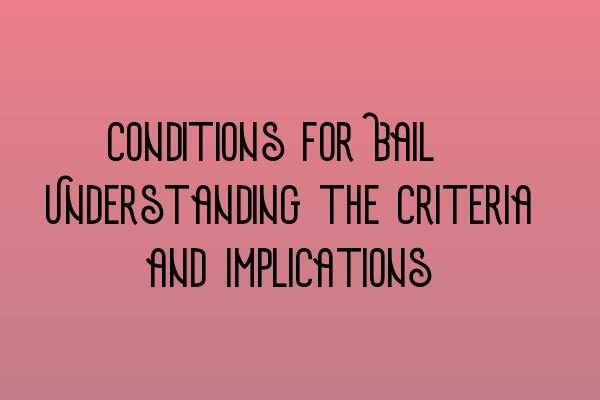Conditions for Bail: Understanding the Criteria and Implications
When facing criminal charges, one of the most critical aspects of the legal process is whether or not bail will be granted. Bail allows individuals to be released from custody while awaiting trial, allowing them to continue their lives until their court date. However, the conditions set for bail can vary depending on multiple factors, which we will explore in this article.
Understanding the Criteria for Granting Bail
The decision of whether or not to grant bail hinges on various factors that the court assesses. These factors include the seriousness of the offense, the defendant’s criminal history, the likelihood of flight, and the potential threat posed to public safety. By considering these criteria, the court aims to ensure that individuals granted bail will not present a risk to the community or interfere with the course of justice.
One primary factor is the seriousness of the offense. More serious crimes, such as those involving violence or organized criminal activities, often present a higher risk of reoffending or absconding. In such cases, the court may impose stricter conditions or deny bail altogether.
The defendant’s criminal history is also crucial in determining the conditions for bail. Individuals with a history of prior convictions or breaches of court orders may be considered at higher risk of reoffending or not abiding by the terms of their release. In such cases, the court may impose more stringent conditions or deny bail outright.
The likelihood of flight is another significant consideration. If the court has reason to believe that the defendant is likely to abscond and not attend their court hearings, they may refuse bail or set strict conditions, such as passport surrender or electronic monitoring.
Lastly, the court must weigh the potential threat to public safety. If the defendant poses a risk to the community, potentially endangering individuals’ lives or property, the court may decide against granting bail. In such instances, public safety concerns outweigh the defendant’s right to temporary release.
Implications of Bail Conditions
When bail is granted, the court sets specific conditions that individuals must follow. These conditions are tailored to address the particular circumstances of the case and mitigate potential risks. Failure to adhere to these conditions can result in the revocation of bail and the individual being remanded in custody until their trial.
Common bail conditions include:
- Regular reporting to a designated police station or probation officer
- Abstaining from drugs and alcohol
- Restrictions on traveling outside a specified geographical area
- Electronic monitoring or curfew requirements
It is essential to comply with these conditions to avoid negative consequences. Failure to do so can lead to further legal troubles and impact the court’s perception of the individual’s reliability and trustworthiness.
If you require assistance or more information regarding bail conditions, our experienced team at SQE Criminal Law & Practice Law UK is here to help. We specialize in criminal law and can provide guidance tailored to your specific needs.
For related articles and resources:
- SQE 1 Practice Exam Questions
- SQE 1 Practice Mocks FLK1 FLK2
- SQE 2 Preparation Courses
- SQE 1 Preparation Courses
- SRA SQE Exam Dates
Contact our team today to discuss your case and ensure the best possible outcome.
